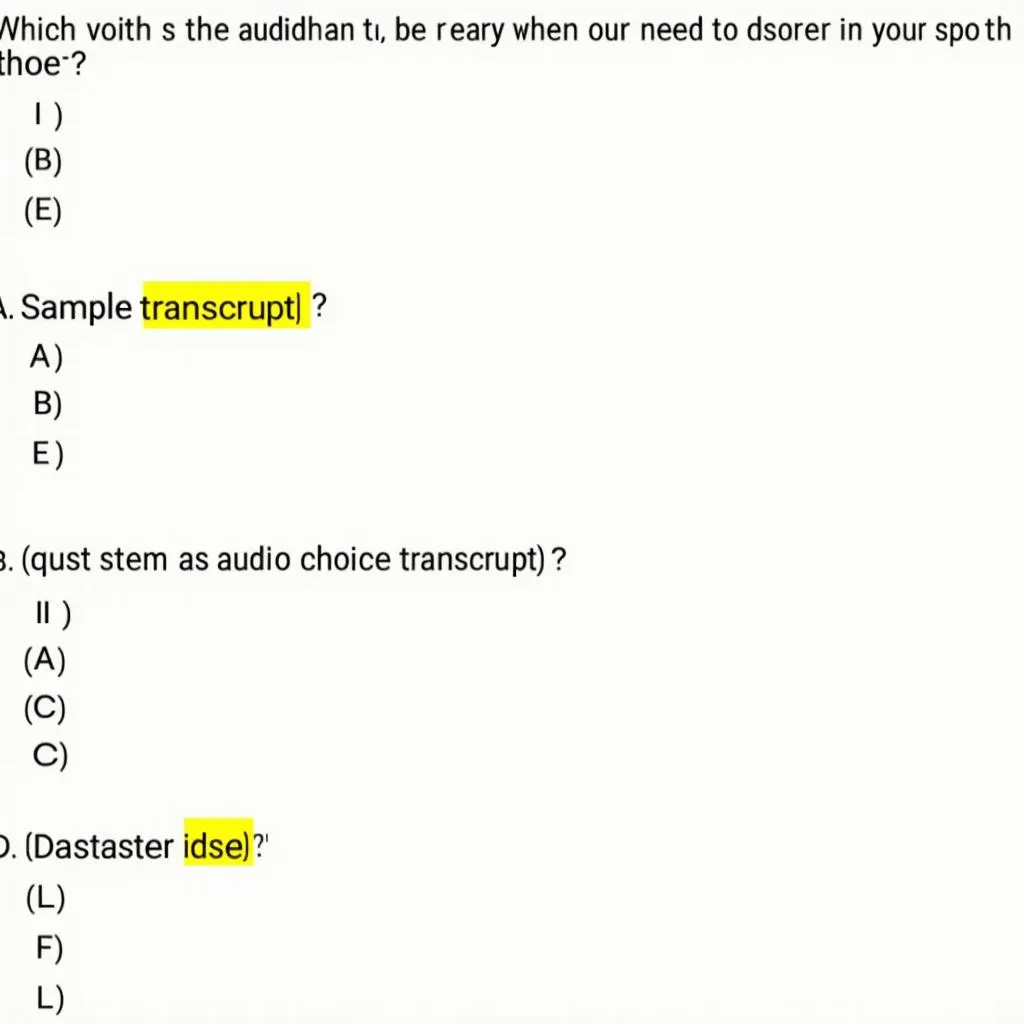Understanding the Challenge of Multiple Choice Questions in IELTS Listening
Multiple choice questions (MCQs) in the IELTS Listening test can be deceptively tricky. They require not only keen listening skills but also the ability to quickly process information and make decisive choices. Many test-takers find these questions challenging due to their complexity and the potential for confusion among answer options.
Common Pitfalls in Multiple Choice Questions
- Similar-sounding options
- Distractors that use synonyms or paraphrases
- Options that are correct but not mentioned in the audio
- Answers that require inference or understanding of context
To overcome these challenges, it’s crucial to develop targeted strategies that enhance your ability to tackle MCQs effectively.

Essential Strategies for Mastering Multiple Choice Questions
1. Preview the Questions and Options
Before the audio begins, take advantage of the time given to read through the questions and answer choices carefully. This preview serves several purposes:
- Familiarize yourself with the topic
- Identify key words and phrases to listen for
- Anticipate the type of information you need to focus on
By doing this, you’re priming your brain to catch relevant information as soon as it’s mentioned in the audio.
2. Listen for Synonyms and Paraphrases
IELTS often uses different words or phrases in the questions compared to what’s said in the audio. Train your ear to recognize synonyms and paraphrases. For example:
- Audio: “The event will commence at 9 AM sharp.”
- Question: “What time does the event begin?”
In this case, “commence” and “begin” are synonyms, and you need to make this connection quickly.
3. Eliminate Incorrect Options
As you listen, start eliminating options that are clearly wrong. This process of elimination can significantly increase your chances of selecting the correct answer, especially if you’re unsure between two choices.
4. Be Wary of Distractors
Distractors are incorrect options that sound plausible. They often include information mentioned in the audio but not relevant to the specific question. Stay focused on answering the exact question asked, rather than selecting an option just because you heard it mentioned.
5. Pay Attention to Qualifying Words
Words like “always,” “never,” “sometimes,” or “occasionally” can completely change the meaning of a statement. Listen carefully for these qualifiers in the audio and check if they match the options provided.
6. Focus on the Speaker’s Tone and Emphasis
Sometimes, the correct answer can be inferred from the speaker’s tone or emphasis. Pay attention to:
- Changes in intonation
- Words or phrases that are stressed
- Pauses or hesitations that might indicate uncertainty or correction
These auditory cues can provide valuable context beyond the literal words spoken.
Advanced Techniques for Tackling Tricky MCQs
1. Practice Active Listening
Develop the habit of actively engaging with the audio content. Instead of passively letting the words wash over you, try to:
- Visualize the scenario being described
- Predict what might come next based on context
- Mentally summarize key points as you listen
This active engagement helps maintain focus and improves comprehension, especially during longer listening passages.
2. Improve Your Note-Taking Skills
While you can’t write extensively during the listening test, strategic note-taking can be incredibly helpful. Focus on:
- Key words and numbers
- Symbols and abbreviations for quick reference
- Structural markers (e.g., “firstly,” “in contrast,” “finally”)
Develop a personal system of shorthand that allows you to capture essential information without losing focus on the audio.
3. Time Management
Multiple choice questions often appear in sets, and it’s crucial to manage your time effectively:
- Quickly read ahead to the next question while still listening
- If you miss an answer, move on rather than dwelling on it
- Use any pauses or transitions in the audio to double-check your answers
Remember, each question is equally weighted, so it’s better to attempt all questions rather than getting stuck on one difficult item.
4. Contextual Understanding
Sometimes, the correct answer requires you to understand the broader context of the conversation or lecture. Pay attention to:
- The overall topic and purpose of the audio
- Relationships between different pieces of information
- Any conclusions or summaries provided
This holistic understanding can help you make educated guesses even when you’re not 100% certain of an answer.
Common Mistakes to Avoid
- Rushing to select the first option that sounds correct: Take time to consider all choices before deciding.
- Ignoring options after hearing a familiar word: The correct answer might be in a later option.
- Changing answers without good reason: Trust your initial instinct unless you’re certain you’ve made a mistake.
- Focusing too much on unfamiliar vocabulary: Try to understand the overall meaning even if you don’t know every word.
Practice and Preparation Tips
- Use authentic IELTS practice materials: Familiarize yourself with the format and difficulty level of real IELTS questions.
- Time yourself during practice: Simulate test conditions to improve your time management skills.
- Analyze your mistakes: After each practice session, review incorrect answers to understand why you made those errors.
- Expand your vocabulary: Focus on words and phrases commonly used in IELTS listening topics.
- Listen to a variety of English accents: The IELTS test features speakers with different accents, so expose yourself to diverse English varieties.
By consistently applying these strategies and avoiding common pitfalls, you can significantly improve your performance on multiple choice questions in the IELTS Listening test. Remember, success comes with practice and a strategic approach. Keep refining your skills, and you’ll be well-prepared to tackle even the trickiest MCQs on test day.